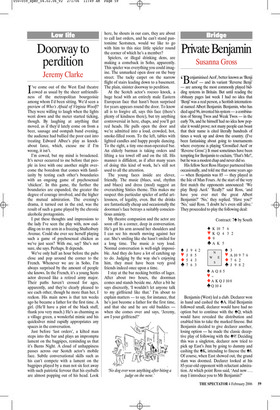Doorway to perdition
Jeremy Clarke
I’ve come out of the West End theatre cowed as usual by the sheer unfriendliness of the metropolitan bourgeoisie among whom I’d been sitting. We’d seen a preview of Who’s Afraid of Virginia Woolf? They were willing to laugh when the lights went down and the meter started ticking, though. By laughing at anything that moved, as if they’d lately come on from a beer, sausage and oompah band evening, the audience had bullied the poor cast into treating Edward Albee’s play as knockabout farce, which, excuse me if I’m wrong, it isn’t.
I’m cowed, but my mind is broadened. It’s never occurred to me before that people in love with one another might overcome the boredom that comes with familiarity by testing each other’s boundaries with an ongoing game of psychosexual ‘chicken’. In this game, the further the boundaries are expanded, the greater the degree of courage involved, and the higher the mutual admiration. The evening’s drama, it turned out in the end, was the result of such a game played by the chronic alcoholic protagonists.
I put these thoughts and impressions to the lady I’ve seen the play with, now cuddling on to my arm in a freezing Shaftesbury Avenue. Could she ever see herself playing such a game of psychosexual chicken as we’ve just seen? With me, say? She’s not sure, she says. Perhaps. It depends.
We’ve only half an hour before the pubs close and pop around the corner to the French. Whenever we are in Soho, I’m always surprised by the amount of people she knows. In the French, it’s a young Scots actor dressed like a retired army major. Their paths haven’t crossed for ages, apparently, and they’re clearly pleased to see each other, though he more than her, I reckon. His main news is that ten weeks ago he became a father for the first time. A girl. (He’ll have a pint of the black stuff, thank you very much.) He’s as charming as a village green, a wonderful mimic and his quicksilver mind rapidly appropriates any spaces in the conversation.
Just before ‘last orders’, a kilted man steps into the bar and plays an impromptu lament on the bagpipes, reminding us that it’s Burns Night. A cloud of unhappiness passes across our Scotch actor’s mobile face. Subtle conversational skills such as his can’t compete with a lament on the bagpipes played by a man not six feet away with such patriotic fervour that his eyeballs are almost popping out of his head. Look here, he shouts in our ears, they are about to call last orders, and he can’t stand pantomime Scotsmen, would we like to go with him to this nice little spieler round the corner of which he’s a member?
Spielers, or illegal drinking dens, are making a comeback in Soho, apparently. This spieler was everything you could imagine. The unmarked open door on the busy street. The tacky carpet on the narrow flight of stairs leading down to a basement. The plain, sinister doorway to perdition.
At the Scotch actor’s rococo knock, a huge head with an entirely male Eastern European face that hasn’t been surprised for years appears round the door. To know all is to forgive all, says this face (there’s plenty of kindness there), but try anything controversial in here, chaps, and you’ll get red heads. He pulls open the door and we’re admitted into a loud, crowded, hot, smoke-filled room. To the left, tables with lighted candles and happy people dancing. To the right, a tiny one-man-operated bar. An elderly barman is taking orders and lifting a tea towel off and on the till. His manner is diffident, as if after many years of doing this kind of work, he’s still not used to all the attention.
The young faces inside are clever, friendly. The music (blues, soul, rhythm and blues) and dress (mod) suggest an overarching Sixties theme. This makes me suspect this particular spieler of artful artlessness, of legality, even. But the drinks are fantastically cheap and occasionally the doorman’s face betrays a suitably conscientious anxiety.
My theatre companion and the actor are soon off in a corner, deep in conversation. He’s got his arm around her shoulders and I can see his mouth moving against her ear. She’s smiling like she hasn’t smiled for a long time. The music is very loud. Normal conversation is well-nigh impossible. And they do have a lot of catching up to do. Judging by the way she’s enjoying him, they must have been very good friends indeed once upon a time.
I stay at the bar necking bottles of lager. After about two hours, the doorman comes and stands beside me. After a bit he says discreetly, ‘I wouldn’t let anyone talk to my girlfriend like that.’ I’m about to explain matters — to say, for instance, that he’s just become a father for the first time, and that she and he are old buddies when she comes over and says, ‘Jeremy, am I your girlfriend?’





























































































































 Previous page
Previous page